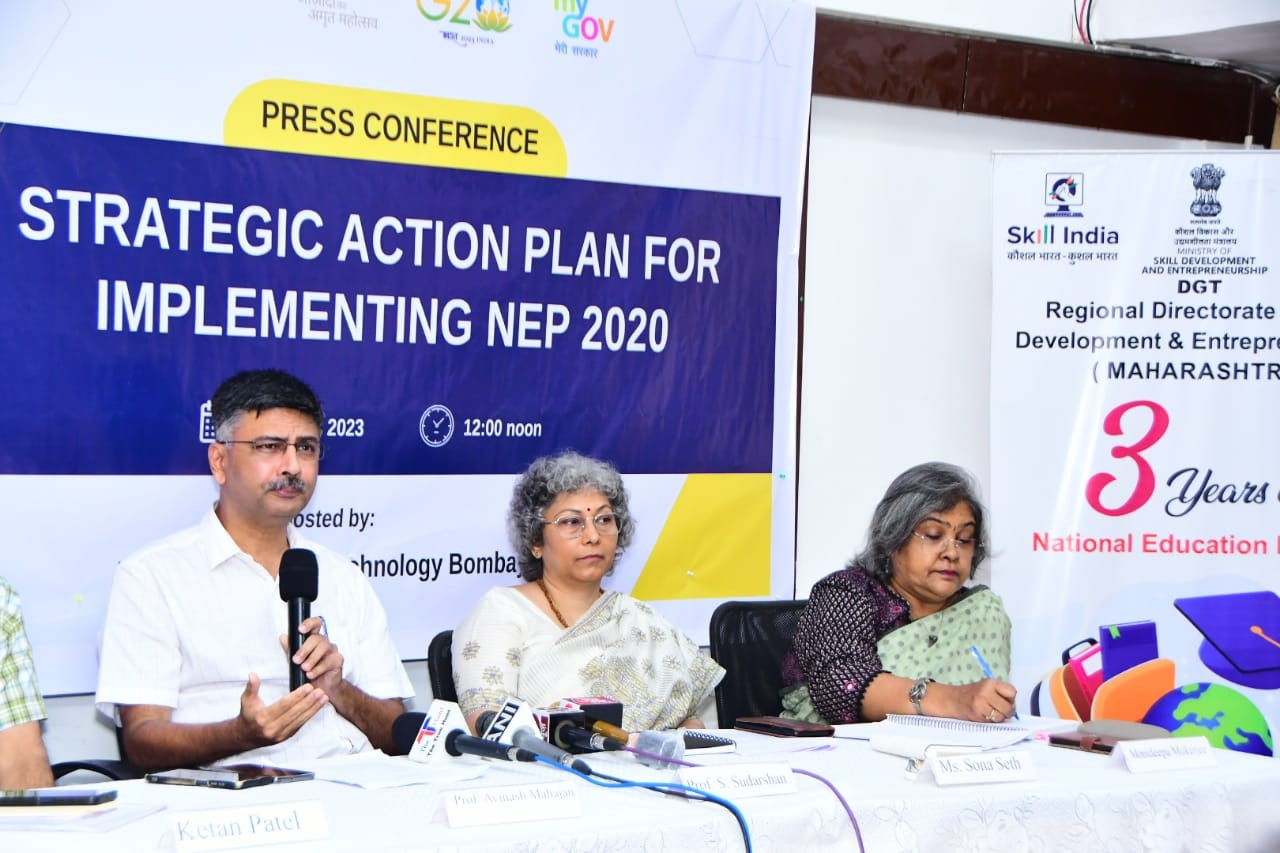Ahead of the third anniversary of its launch, a cross-section of academics and skilling experts have hailed the National Education Policy (NEP) 2020 for its stress on flexibility and holistic development.
At a press meet was held in Mumbai Tuesday, Prof S. Sudarshan, deputy director, IIT, Bombay, spoke on how NEP has made way for flexibility in higher education and explained how core courses and a number of electives comparable to the core courses at IIT-B allow flexibility to students. He said flexibility is an essential component of NEP 2020. It is the hallmark of any successful education system and it creates a well-grounded individual. Students have wide freedom to choose courses across disciplines.
“Apart from flexibility, new disciplines beyond traditional lines envisaged by the NEP have been encouraged at IIT such as the School of Management, School for Entrepreneurship and others.”
Ketan Patel, joint director, ministry of skill development & entrepreneurship, said that the main intension of the ministry is to develop a skilled manpower not only for the country but to the whole world. NEP recognizes the importance of holistic development to foster the cognitive, socio-emotional, and physical skills of students. “It promotes a multidisciplinary approach that encourages students to explore various subjects and develop well-rounded skill sets.”
He further said that integration of vocational education with general education, convergence and integration of skills across disciplines/sectors, technology-enabled learning, entrepreneurship and life skills, teacher training and professional development, experiential learning through internship and apprenticeship, continuous evaluation, fostering global competence in skill development, inclusive and sustainable skills, skilling in regional languages lay the foundation for credit framework, facilitating mobility between general and vocational education, creating a seamless educational journey for students are only some of the aspects under NEP 2020 that focus on skill development.
Prof Avinash Mahajan, dean (academic programmes), IIT-B, explained about different programmes at his institute that align with various provisions of the NEP 2020 as below:
a) A credit-based system for both core and elective courses
b) Electives allowing students to tailor their own curriculum
c) Credit based internships
d) Exchange semesters allowing greater exposure to students
e) Early exit possibility
f) Robust programs with foreign universities to facilitate internationalization
g) Educational Outreach through online and offline mode for skilling
Sona Seth, deputy commissioner, Kendriya Vidyalaya (KV) Sangathan, Mumbai Region, said that NEP is a robust, child-centric document which keeps abreast with latest pedagogy. She elaborated on various initiatives undertaken by the KVs on the backdrop of the NEP 2020, and explained that (a) the age of admission in Class I was revised to 6+ years from the academic year 2022–23 in all KVs, (b) tracking of the progress of students of Classes I, II and III in terms of the attainment of Lakshyas under the NIPUN Initiative is being monitored by recording the same through a web-application linked to the PIMS, (c) Balvatika has been introduced in 49 KVs having permanent building on pilot basis in the session 2022-23 and 5477 children admitted in all the three classes of Balvatika, (d) NCERT has developed a 3 months play based ‘School Preparation Module’ for grade I named ‘Vidya Pravesh’ which is being implemented in all the KVs across the country from the academic year 2021-22, (e) National Curriculum Framework for Foundational Stage (NCF FS) launched on 20th October, 2022, is the first ever integrated curriculum framework for children between ages 3-8 in India which is followed by KVs, (f) vocational and skill straining class VIII onwards has been introduced making parent a stakeholder and imparting training to teachers through NISHTHA programme.
Apart from this, she said, KVs have also become active participants in various schemes and projects such as Vidyanjali, PM e-VIDYA, Atal Innovation Mission (AIM) and others.
On July 29, prime minister Narendra Modi will inaugurate the second Akhil Bharatiya Shiksha Samagam which is coinciding with the third anniversary of NEP, at ITPO, Pragati Maidan, New Delhi.
The two-day event is being organised by the Ministry of Education and the Ministry of Skill Development & Entrepreneurship. The PM will be launching various initiatives on the occasion.
The event will include 16 sessions with discussions on access to quality education and governance, equitable and inclusive education, issues of socio-economically disadvantaged groups (SEDG), national institute ranking framework (NIRF), Indian knowledge system, creating synergy between education and skilling future of work, internationalisation of education, among others.
The sessions will be attended by around 3000 participants including, principal secretaries of education / skill department of states / UTs, directors of IITs, NITs, IIITs, IISERs, IISC, vice-chancellors of central, state and private universities, heads of other HEIs, faculties, principals / teachers / students of schools, ITIs, heads / representatives of regulatory bodies like NCERT, CBSE, UGC, AICTE, NCTE, NCVET, SSCs, NSDC, Heads / representatives of CII, FICCI, NASSCOM, ASSHOCHAM etc. Over 2 lakh attendees ae expected to visit the exhibition including students, youth volunteers and participants of Yuva Sangam.

